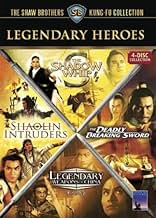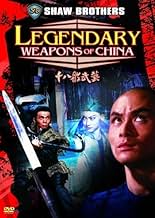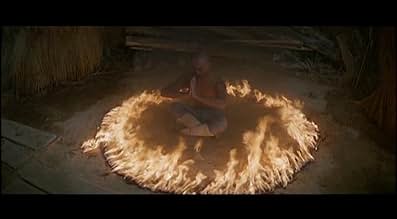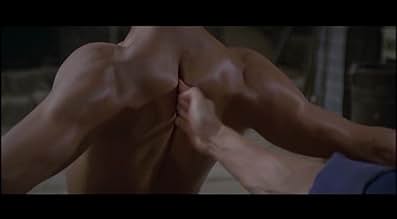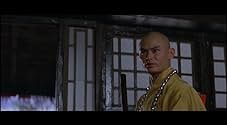A band of killers from an ailing kung fu and magic society are sent on a manhunt for a former member of the society, whose bad mouthing threatens its existence.A band of killers from an ailing kung fu and magic society are sent on a manhunt for a former member of the society, whose bad mouthing threatens its existence.A band of killers from an ailing kung fu and magic society are sent on a manhunt for a former member of the society, whose bad mouthing threatens its existence.
- Director
- Writers
- Stars
- Awards
- 1 nomination total
Liu Chia-Yung
- Lei Ying
- (as Chia-Yung Liu)
Kara Ying Hung Wai
- Fang Shao-Ching
- (as Kara Hui)
- Director
- Writers
- All cast & crew
- Production, box office & more at IMDbPro
Featured reviews
10winner55
This is a brilliantly constructed film. I suppose those who remark it having a 'poor plot' long for something more simple, more direct, more traditionally 'Shaw Bros.' To be sure, the plot is intended to provide support for the interlaced themes, but it is complex and meaty on its own terms.
However the themes are indeed the heart of the film. The comic scene of the fake kung fu battle is clearly intended as a parody of the traditional swordplay film, down to the hand-squeezed blood-squib. The use of magic kung fu is, less clearly because more subtly, intended to debunk the myth of such magic, reducing it to a kind of martial-arts parlor trick - magnificently staged, but of course ineffective against anything other than itself. The real martial arts are at last presented with considerable credibility in the final third of the film, but is intended to remind us that, as powerful as it could be, the martial arts cannot compete with modern weaponry. Along the way, we also deal with problems of family loyalty, national loyalty (vs. phony 'patriotism'), and the nature of the spirituality necessary to master the martial arts, which requires an open mind and compassion rather than blind dedication.
What director Liu is reaching for is nothing less than a complete debunking of all the nonsense that had wrapped itself around the study of the martial arts in the 19th century and which was resurrected in the wake of the kung fu film phenomenon of the 1970s. Liu is asking us to respect, even admire, the martial arts, perhaps to learn them - but on their own terms, without all the myths that obscure their real essence.
This makes for a highly sophisticated script, which Liu carefully keeps popularized not only through the use of humor but, more importantly, by tight compression of story and editing. Blink and you will surely miss an important event.
As for the staging and camera-work some have remarked - technically, this film is pure classic Shaw Bros.
And as for the martial arts in the final battle - absolutely magnificent.
Unique in its genre and a real treat.
However the themes are indeed the heart of the film. The comic scene of the fake kung fu battle is clearly intended as a parody of the traditional swordplay film, down to the hand-squeezed blood-squib. The use of magic kung fu is, less clearly because more subtly, intended to debunk the myth of such magic, reducing it to a kind of martial-arts parlor trick - magnificently staged, but of course ineffective against anything other than itself. The real martial arts are at last presented with considerable credibility in the final third of the film, but is intended to remind us that, as powerful as it could be, the martial arts cannot compete with modern weaponry. Along the way, we also deal with problems of family loyalty, national loyalty (vs. phony 'patriotism'), and the nature of the spirituality necessary to master the martial arts, which requires an open mind and compassion rather than blind dedication.
What director Liu is reaching for is nothing less than a complete debunking of all the nonsense that had wrapped itself around the study of the martial arts in the 19th century and which was resurrected in the wake of the kung fu film phenomenon of the 1970s. Liu is asking us to respect, even admire, the martial arts, perhaps to learn them - but on their own terms, without all the myths that obscure their real essence.
This makes for a highly sophisticated script, which Liu carefully keeps popularized not only through the use of humor but, more importantly, by tight compression of story and editing. Blink and you will surely miss an important event.
As for the staging and camera-work some have remarked - technically, this film is pure classic Shaw Bros.
And as for the martial arts in the final battle - absolutely magnificent.
Unique in its genre and a real treat.
The earlier comments give an unfair slating to what is an enjoyable film.The gaffes are obvious , (in such films as this the 1st class director Liu Chia Liang, was redefining the kung fu film , after the earlier swordplay flicks, and bruce lee's seminal movies, this film is set in late Ching dynasty China.) This is a film of rare quality , combining humour , a reasonable plot and some displays of great martial artistry, such as are no longer found in but a handful of films. The choreography is excellent, (only Sammo Hung at his best approaches Liu 's ability to film a fight with loving care for displaying technique)This film also benefits from the presence of the charismatic Fu Sheng and the Multi talented Hui Ying Hung. The special effects are cheap , but cheerful.(the previous reviewer seems to have missed that the purpose of all the bladed cloaks etc. was to show that tricks are no substitute for skill, skill no defence against bullets ... A classic of Kung Fu cinema
I think watching Shaw Brothers movies is a bit like doing martial arts; if you go a while without practice, you lose the progress and skills you built up. I went on a binge of the studio's movies early last year, then went away for a bit, and now I'm back, feeling out of shape and out of breath trying to keep up with Legendary Weapons of China.
It could be partly or wholly on me, but I'm also open to the idea that this one might just be a bit much. It throws many characters and concepts (voodoo, invulnerable warriors, mistaken identities, disguises, magic, etc) at you so quickly; I was confused from the start and just got more confused as I went on.
Now, a confusing plot hasn't got in the way of me really enjoying martial arts movies before, but I was also confused during various fight scenes in Legendary Weapons of China. It's hard to get a handle on how some of the fantasy elements work, and who has the power to do what, and with the usual fast pacing and feeling that everything is slightly sped up (not just in the fight scenes either, unusually; I think that added to the confusion for me), I couldn't keep up.
Now, if that's on me (and I'm sure at least some of it is), I can't call this terrible. There is at least the ability to admire its ambition and unique qualities, even if those things did make me lose track of the things I'd usually enjoy. And the final fight scene did redeem things in my eyes a little. It downplays the crazy magic stuff to mostly just be a one-on-one fight that goes on for a while and involves many different weapons, and it was easily the most impressive sequence from a stunt/choreography perspective.
This is the kind of film where anyone who can keep up is likely to have a blast, but for whatever reason, tonight, it was just a little too much too fast for me personally. Gotta get back to my Shaw Brothers training regime, maybe...
It could be partly or wholly on me, but I'm also open to the idea that this one might just be a bit much. It throws many characters and concepts (voodoo, invulnerable warriors, mistaken identities, disguises, magic, etc) at you so quickly; I was confused from the start and just got more confused as I went on.
Now, a confusing plot hasn't got in the way of me really enjoying martial arts movies before, but I was also confused during various fight scenes in Legendary Weapons of China. It's hard to get a handle on how some of the fantasy elements work, and who has the power to do what, and with the usual fast pacing and feeling that everything is slightly sped up (not just in the fight scenes either, unusually; I think that added to the confusion for me), I couldn't keep up.
Now, if that's on me (and I'm sure at least some of it is), I can't call this terrible. There is at least the ability to admire its ambition and unique qualities, even if those things did make me lose track of the things I'd usually enjoy. And the final fight scene did redeem things in my eyes a little. It downplays the crazy magic stuff to mostly just be a one-on-one fight that goes on for a while and involves many different weapons, and it was easily the most impressive sequence from a stunt/choreography perspective.
This is the kind of film where anyone who can keep up is likely to have a blast, but for whatever reason, tonight, it was just a little too much too fast for me personally. Gotta get back to my Shaw Brothers training regime, maybe...
10bickeler
Anyone who has reviewed this movie and stated the plot is stupid has no knowledge of 19th century China. In fact during the Boxer Rebellion these "Boxers" believed through rituals they could make themselves impervious to firearms. No I am not making this up and neither did Chia-Liang Liu and while he exaggerated and had fun with it for comedic values he was making an historical notation. The Martial Arts in this movie are exceptional and so is the outrageous humor instilled in this movie. Not only did he poke fun at the Boxers but also many of the Martial Arts movies of the 1970s that went a little overboard with the magical Kung Fu element. And all in the same breath showed the usage of almost every weapon used in Chinese Martial Arts. The talent in this movie speaks for itself aside from Liu and his brothers there is Fu Sheng, Hou Hsiao and the sweet Kara Hui. They don't make Martial Arts movies this original or good anymore either with all the Ip Man clones and CGI epics not even close. All I can say is Chia-Liang Liu you are sorely missed.... And the point is no amount of skill will help you dodge a bullet!
The Yi Ho Society wrongly think that their magic and pugilism skills will protect them from any weapon, including the guns used by the West. Lei Kung (Chia-Liang Liu) realises that this belief will only result in senseless bloodshed and attempts to dissolve the society to save lives. In doing so, he is branded a traitor and is hunted by several of Yi Ho's best fighters.
I love weapons work in kung fu films and Legendary Weapons of China naturally features lots of it, mostly in the second half; unfortunately, the movie also has rather a lot of comedy (in the first half), something that I always struggle with in kung fu films, making the film as a whole something of a mixed bag for me: desperately unfunny nonsense for the best part of an hour, but ending on a high with plenty of crazy fight action employing the eighteen main weapons of Chinese martial arts: rope dart, double tiger hook swords, double hammers, battle axe, snake halberd, kwan dao, twin broadswords, double-edged sword, Chinese spear, three-section chain whip, double daggers, double crutches, monk's spade, staff, tiger fork, rattan shield, single butterfly sword and three-section staff.
Also adding to the fun are the film's sillier weapons, including booby trapped capes and explosive darts, and some really daft moments, best bits being a bonkers fight in the rain and the unforgettable sight of two warriors mutilating themselves, the first poking his own eyes out and the other ripping his goolies off!
5.5 out of 10, rounded up to 6 for IMDb-not the classic of the genre that I had expected, but entertaining enough.
I love weapons work in kung fu films and Legendary Weapons of China naturally features lots of it, mostly in the second half; unfortunately, the movie also has rather a lot of comedy (in the first half), something that I always struggle with in kung fu films, making the film as a whole something of a mixed bag for me: desperately unfunny nonsense for the best part of an hour, but ending on a high with plenty of crazy fight action employing the eighteen main weapons of Chinese martial arts: rope dart, double tiger hook swords, double hammers, battle axe, snake halberd, kwan dao, twin broadswords, double-edged sword, Chinese spear, three-section chain whip, double daggers, double crutches, monk's spade, staff, tiger fork, rattan shield, single butterfly sword and three-section staff.
Also adding to the fun are the film's sillier weapons, including booby trapped capes and explosive darts, and some really daft moments, best bits being a bonkers fight in the rain and the unforgettable sight of two warriors mutilating themselves, the first poking his own eyes out and the other ripping his goolies off!
5.5 out of 10, rounded up to 6 for IMDb-not the classic of the genre that I had expected, but entertaining enough.
Did you know
- TriviaChia-Liang Liu: [martial arts demonstration] Opening credits show a demonstration of martial arts against an empty backdrop.
- Alternate versionsThe 1987 UK video suffered extensive cuts of over 5 minutes and lost all footage of Japanese throwing stars and nunchaku used in the fight scenes.
- ConnectionsFeatured in Knockaround Guys (2001)
- How long is Legendary Weapons of China?Powered by Alexa
Details
- Release date
- Country of origin
- Languages
- Also known as
- Shi ba ban wu yi
- Production company
- See more company credits at IMDbPro
- Runtime
- 1h 49m(109 min)
- Sound mix
- Aspect ratio
- 2.35 : 1
Contribute to this page
Suggest an edit or add missing content



